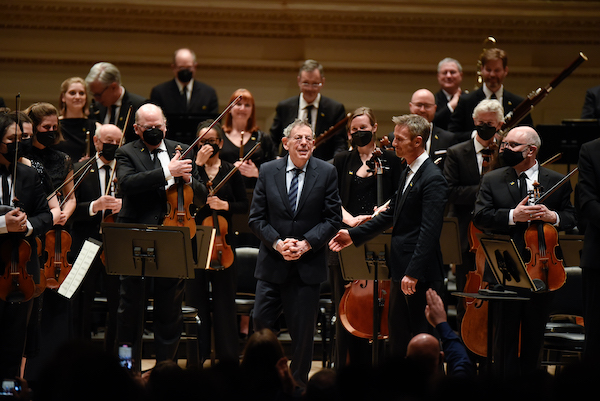Glass’s 13th Symphony makes U.S. debut in illuminating National Arts Centre Orchestra concert

Canada’s National Arts Centre Orchestra came to Carnegie Hall Tuesday night with the big draw of the U.S. premiere of Philip Glass’s Symphony No. 13.
The main story, though, was what else was on the program: a colorful miniature from Nicole Lizée, Shostakovich’s Symphony No. 9, and the Violin Concerto by Erich Wolfgang Korngold, played by James Ehnes. With Alexander Shelley conducting, these were fine performances, and the surprising and interesting element was how Glass’s music stood apart from the rest—like a friendly guest at a party who just doesn’t speak the same language.
This wasn’t bad, but it proved fascinating. Even with Shostakovich’s sarcastic Ninth and Lizée’s experiment in timbre and form on the bill, Glass came off as quirky, mischievous, but not necessarily public and open.
The concert was as much a capsule presentation of the orchestra as an institution as well as a performing ensemble. The NACO has a crisp, slightly light sound, sonorous but expressive through articulation, color, and agility rather than mass, and this suited all the pieces. As an institution, the orchestra commissioned both Lizée’s Zeiss After Dark and Glass’s symphony; the former for Canada’s 2017 sesquicentennial and the latter as an honor to the late newsman Peter Jennings.
Shelley was a cool and charismatic presence at the podium, minimal and unfussy in his gestures, conducting much of the music from memory. He also spoke at length to the audience, explaining what the orchestra was and the absence of the spoken-word performer YAO, who was down with Covid, and then later introducing the encore from Ehnes and the orchestra.
Lizée’s notes described her inspiration, of the famous candlelit scene from Stanley Kubrick’s movie Barry Lyndon, and how she was interested in capturing the flickering quality. The title had to do with the camera lens, but one could not help think of the Zeiss projectors at some planetariums, filling domes with sparkling light. And indeed, this two-minute work was like seeing stars gradually appear as twilight receded and darkness fell across the sky.
In his remarks, Shelley subtly underlined what it meant to hear Shostakovich’s symphony while Russia is waging war against Ukraine. Like all of Shostakovich’s music, that character changes with the context of the performance, and Tuesday night the bright piccolo lines and off-kilter march rhythms in the opening movement sounded mocking. The inner slow movements were haunting, and principal bassoonist Christopher Millard’s solo was mesmerizing and deeply expressive, beautiful and upsetting in that unique way Shostakovich has.
There was great concentration in the first four movements, but the energy dissipated with the start of the finale. The feeling was slack for a while—the only significant flaw in the evening’s performance—but Shelley and the orchestra picked up force, organically, as they reached the final pages.

There was plenty of energy in Korngold’s concerto, and with Ehnes playing with a silky, silvery sound, this was a gorgeous performance of one of the brightest and most pleasing pieces in the repertoire. The pace was superb throughout—there are parts for the violin section as a whole that mirror the soloist, and these came off with the kind of skill that drives the musicians and captivates the listener. The colors in the orchestra were excellent, especially in the second movement, and the balances between the group and Ehnes were just right. Ehnes pushed the tempo every time he was in the middle of a fast passage, but Shelley always brought the orchestra around to meet him in the end.
For an encore, Ehnes and the orchestra played a piece by Yuri Shevchenko that the composer built off of the Ukrainian National Anthem. Shelley explained that they had only recently prepared this, both because of the war and to acknowledge Shevchenko’s tragic death on March 24, from pneumonia. Aged 68, the composer died in a basement in Kyiv as the city was preparing for a possible siege from the Russian army. Shelley translated the title as “We Do Exist,” a bit more than the original translation of “We Are,” but again, in this context, the sentimental nature of the music became a lovely way to honor both the living and mourn the dead.
The first three-fourths of the concert built emotion, while Glass’s Thirteenth Symphony deflected it into charming and ambiguous fragments. The composer’s symphonies of the last several years have had a similar quality—which may seem redundant discussing Glass—but is identifiable and notable. The repetitions and arpeggios were there of course, and there was great economy of means in this three-movement work. Glass’ melodies are always graceful, and for music of this work he used harmonic rhythm as both structure and melody.
There were also stimulating and beguiling idiosyncrasies. The first movement followed a basic sonata form, and the secondary idea and development both featured unusual polytonality, the chords meeting in a kind of ring-modulated halo of dissonance, while also drifting farther away from the solid ground of the key than one has ever heard with Glass. Small ideas would appear and then be discarded, the first two movements eschewed codas and just came to an end when the musicians stopped.
The finale introduced a quintuple meter and did wrap things up with a brief coda, the feeling of a real double-bar, but throughout this piece Glass seemed to be exploring whatever notions came into his head. The form was full of surprises that felt personal, the artist doing what pleased him rather than what might have been expected. It was simple, and also guileless, not trying to guide any feelings but instead nonchalantly opening up a myriad of them.